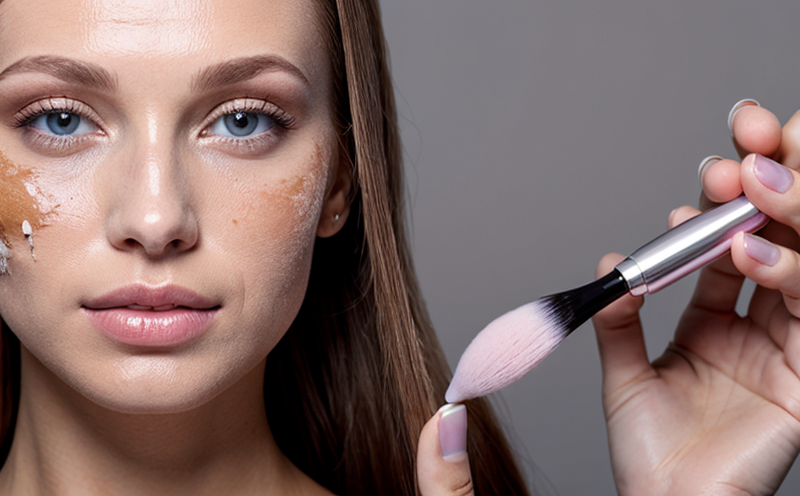Water Resistance of Sunscreen Assessment
The water resistance assessment of sunscreens is a critical component in ensuring that cosmetic products meet regulatory requirements and consumer expectations. This service focuses on evaluating how well sunscreen formulations maintain their protective properties when exposed to water, which can significantly reduce the effectiveness of sunscreen if not adequately tested.
Understanding the importance of this test involves recognizing that water resistance is measured based on the time it takes for a specific amount of water (typically 20 ml) to wash off the sunscreen from an applied layer on human skin. This test is particularly important because many users, especially those engaging in aquatic activities, may unknowingly reduce their sun protection by washing away the sunscreen.
The ISO standard relevant to this assessment is ISO 18437:2018, which provides detailed guidance for testing water resistance of cosmetic sunscreens. This international standard ensures that all tests are conducted under consistent and reproducible conditions, enhancing reliability across different laboratories around the world.
During the test, a layer of sunscreen is applied to the skin in accordance with specified guidelines, followed by exposing it to a standardized amount of water for a set duration. The effectiveness of the sunscreen after this exposure period is then evaluated based on its UV protection factor (SPF). If the SPF drops below the claimed value by more than 40% or if the SPF becomes zero, the sunscreen fails the test and does not meet regulatory requirements.
This assessment service includes comprehensive analysis using state-of-the-art equipment that simulates real-world conditions as closely as possible. Our technicians follow stringent protocols to ensure accurate and reliable results. By partnering with us for this crucial step in product development or compliance assurance, your company can rest assured that its sunscreen products are robustly tested and ready for the market.
Understanding the broader context of regulatory compliance is important. Regulatory bodies like the European Commission (EC) and the US Food and Drug Administration (FDA) have stringent requirements for water resistance testing to ensure consumer safety. By adhering to these standards, manufacturers can avoid potential legal issues and maintain a strong reputation in the industry.
Benefits
The benefits of our water resistance testing service extend beyond mere compliance with regulations; they encompass enhancing product performance, safeguarding consumer health, and boosting brand reputation. By ensuring that sunscreens maintain their effectiveness in water, manufacturers can provide safer and more reliable products to consumers.
Compliance with regulatory standards not only protects users but also shields companies from potential legal issues. This service helps brands navigate complex regulations confidently, knowing that they are adhering to the highest international standards. Moreover, successful testing results contribute significantly to brand reputation by demonstrating a commitment to quality and safety.
The enhanced consumer trust gained through this rigorous testing process can translate into increased sales and customer loyalty. Brands that prioritize product safety and effectiveness are more likely to attract and retain customers, fostering long-term relationships.
Competitive Advantage and Market Impact
- First-to-market compliance: Ensure your products meet regulatory standards before competitors, giving you a strategic advantage.
- Informed decision-making: Gain deep insights into the performance of your sunscreen formulations under water exposure conditions.
- Enhanced brand reputation: Demonstrate your commitment to product safety and effectiveness, which can significantly improve consumer trust.
- Avoid legal risks: By adhering to stringent standards, you minimize the risk of regulatory penalties or recalls.
The rigorous testing we provide not only ensures compliance but also enhances brand reputation. Consumers are increasingly concerned about product safety and effectiveness, making this service a crucial differentiator in an already competitive market.
Use Cases and Application Examples
| Application Example | Description |
|---|---|
| Sunscreen Formulation Development | Developing new sunscreen formulations that can withstand water exposure requires thorough testing. Our service ensures that these products meet the required standards before they reach the market. |
| Product Reformulation | Reformulating existing sunscreen products to improve their water resistance is crucial for maintaining consumer trust and compliance with regulatory requirements. |
| New Product Launches | New product launches should undergo rigorous testing to ensure they meet all regulatory standards. This service provides the necessary data to support successful market entry. |
| Compliance Audits | Periodic compliance audits are essential for maintaining ongoing adherence to regulatory requirements. Our service ensures that products remain compliant over time. |
This testing is particularly important in the cosmetic industry, where consumer trust and product safety are paramount. By ensuring that sunscreens meet water resistance standards, we help companies maintain a strong reputation and build consumer confidence.





